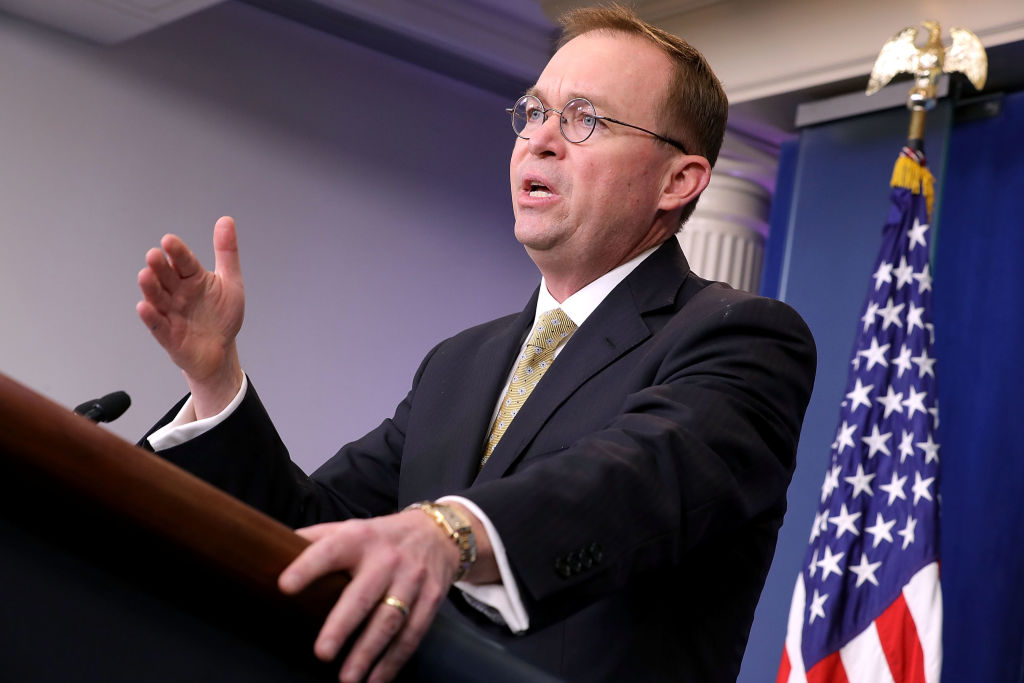Mick Mulvaney formally asks Congress to neuter the consumer financial protection agency he heads


A free daily email with the biggest news stories of the day – and the best features from TheWeek.com
You are now subscribed
Your newsletter sign-up was successful
Mick Mulvaney, President Trump's budget director, asked Congress on Monday to weaken the power and independence of the Consumer Financial Protection Bureau, the consumer watchdog he temporarily heads as his second job. "The bureau is far too powerful, with precious little oversight of its activities," Mulvaney said in a note accompanying a 56-page report to Congress, his first as acting CFPB director. Among his suggestions were requiring that all significant rules be approved by Congress, allowing the president to fire the CFPB director for any reason not just specific and justifiable cause, and taking away the bureau's independent funding from the Federal Reserve and handing it to Congress.
"The power wielded by the director of the bureau could all too easily be used to harm consumers, destroy businesses, or arbitrarily remake American financial markets," Mulvaney said. Banking lobbyists cheered his suggestions, but consumer advocates frowned. Mulvaney's changes "would stab a knife through the heart of the CFPB's mandate to protect consumers from financial industry abuses," said Public Citizen's Lisa Gilbert. Ed Ed Mierzwinski at the U.S. Public Interest Research Group said that Mulvaney had already "made it clear" he wants "a weak agency that payday lenders and Wall Street can run roughshod over."
Mulvaney is set to testify before Congress next week, setting up a likely showdown with Sen. Elizabeth Warren (D-Mass.), the CFPB's strongest defender. Mulvaney has already steered the agency away from prosecuting payday lenders and frozen its enforcement actives, but the changes he is proposing require approval by Congress. "The chances of this are slim," The New York Times says, "as Democrats in the Senate have vowed to block any bills that would harm the consumer bureau."
The Week
Escape your echo chamber. Get the facts behind the news, plus analysis from multiple perspectives.

Sign up for The Week's Free Newsletters
From our morning news briefing to a weekly Good News Newsletter, get the best of The Week delivered directly to your inbox.
From our morning news briefing to a weekly Good News Newsletter, get the best of The Week delivered directly to your inbox.
Before Mulvaney took over — an appointment subject to legal challenge — the CFPB provided about $12 billion in refunds and debt relief for consumers and played a central role in punishing Wells Fargo for creating millions of accounts without customer permission.
A free daily email with the biggest news stories of the day – and the best features from TheWeek.com
Peter has worked as a news and culture writer and editor at The Week since the site's launch in 2008. He covers politics, world affairs, religion and cultural currents. His journalism career began as a copy editor at a financial newswire and has included editorial positions at The New York Times Magazine, Facts on File, and Oregon State University.
-
 Political cartoons for February 18
Political cartoons for February 18Cartoons Wednesday’s political cartoons include the DOW, human replacement, and more
-
 The best music tours to book in 2026
The best music tours to book in 2026The Week Recommends Must-see live shows to catch this year from Lily Allen to Florence + The Machine
-
 Gisèle Pelicot’s ‘extraordinarily courageous’ memoir is a ‘compelling’ read
Gisèle Pelicot’s ‘extraordinarily courageous’ memoir is a ‘compelling’ readIn the Spotlight A Hymn to Life is a ‘riveting’ account of Pelicot’s ordeal and a ‘rousing feminist manifesto’
-
 TikTok secures deal to remain in US
TikTok secures deal to remain in USSpeed Read ByteDance will form a US version of the popular video-sharing platform
-
 Unemployment rate ticks up amid fall job losses
Unemployment rate ticks up amid fall job lossesSpeed Read Data released by the Commerce Department indicates ‘one of the weakest American labor markets in years’
-
 US mints final penny after 232-year run
US mints final penny after 232-year runSpeed Read Production of the one-cent coin has ended
-
 Warner Bros. explores sale amid Paramount bids
Warner Bros. explores sale amid Paramount bidsSpeed Read The media giant, home to HBO and DC Studios, has received interest from multiple buying parties
-
 Gold tops $4K per ounce, signaling financial unease
Gold tops $4K per ounce, signaling financial uneaseSpeed Read Investors are worried about President Donald Trump’s trade war
-
 Electronic Arts to go private in record $55B deal
Electronic Arts to go private in record $55B dealspeed read The video game giant is behind ‘The Sims’ and ‘Madden NFL’
-
 New York court tosses Trump's $500M fraud fine
New York court tosses Trump's $500M fraud fineSpeed Read A divided appeals court threw out a hefty penalty against President Trump for fraudulently inflating his wealth
-
 Trump said to seek government stake in Intel
Trump said to seek government stake in IntelSpeed Read The president and Intel CEO Lip-Bu Tan reportedly discussed the proposal at a recent meeting
